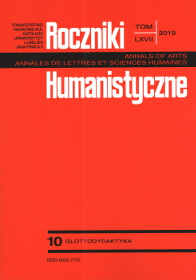Justice as Fairness: Moral Values in Glottodidactics
Abstract
The present study, devoted to the complex theme of moral values and valuation, focuses on the concept of justice understood as fairness, the virtue of special importance in teacher’s work. Fairness is the basic principle in the existence and coexistence of all human societies, including school and academic communities. Emphasized here is the uniqueness and interdisciplinarity of the Polish school of glottodidactics that has built its theoretical foundations on anthropological facts. The argument is based on the assumption that fixed human nature determines the objective and invariable hierarchy of values. A thorough analysis is offered of various philosophical attempts at formulating a universal hierarchy of moral values in relation to human nature. A need of updating the reflection on values is postulated, particularly with reference to the sense of justice, as its interpretations should be based on more rigorous theoretical foundations. An attempt is made in this direction by evoking the central claims of John Rawls’ Theory of Justice, a multidimensional explication of the natural human capacity to develop a sense of justice. Finally, far-reaching practical implications of treating justice as fairness are offered for the (glotto)didactic work of the teacher.
References
Arystoteles, Etyka Nikomachejska, tłum. D. Gromska, w: tenże, Dzieła Wszystkie, tom V, Warszawa: Wydawnictwo Naukowe PWN 1996.
Bocheński J.M., Wszystko podlega prawom logiki poza którą jest już tylko nonsens, „Znak” 328(1982), 83-94.
Bocheński J.M., O moralności, etyce i mądrości, „Kultura”, 7-8 (1991) (526-527), s. 132-159.
Bocheński J.M., Podręcznik mądrości tego świata, Kraków: Philed 1992.
Bocheński J.M., Logika i filozofia, Warszawa: Wydawnictwo Naukowe PWN 1993.
Brown D., Human Universals, Philadelphia: Temple University Press 1991.
Chomsky N., Knowledge of Language. Its Nature, origin and Use, New York: Praeger 1986.
Chomsky N., O naturze i języku, tłum. J. Lang, Poznań: Axis 2005.
Grucza F., Glottodydaktyka: nauka – praca naukowa – wiedza, „Przegląd Glottodydaktyczny” 20(2004), s. 5-48.
Grucza F., Zum ontologischen Status menschlicher Sprachen, ihren Funktionen, denAufgaben der Sprachwissenschaft und des Sprachunterrichts, „Kwartalnik Neofilologiczny” 3(2010), s. 258-274.
Jan Paweł II, Veritatis splendor. Tekst i komentarze, red. A. Szostek, Lublin: Redakcja Wydawnictw KUL 1995.
Katechizm Kościoła Katolickiego, Poznań: Pallotinum 1994.
Kowalczyk S. Współczesny kryzys ideowo-aksjologiczny, Lublin: Wydawnictwo KUL 2011.
Lewis C.S., Rozważania o chrześcijaństwie, przeł. Z. Kościuk, Warszawa: Logos 2002.
Pinker S., Tabula rasa. Spory o naturę ludzką, Gdańsk: Gdańskie Wydawnictwo Psychologiczne 2005.
Platon Państwo, przeł., wstępem i komentarzami opatrzył: W. Witwicki, Kęty: Antyk 2003.
Rawls J., Teoria sprawiedliwości, Warszawa: Wydawnictwo Naukowe PWN 1994.
Sadownik B., Modulare Architektur der menschlichen Sprachfähigkeit – kognitive und neurobiologische Dimensionen, Lublin: Wydawnictwo UMCS 2010.
Sadownik B., Język w strukturze modularnej umysłu, „Lingwistyka Stosowana” 5(2012), s. 75-85.
Sadownik B., Ausgewählte Forschungsschwerpunkte und zukünftige Entwicklungstendenzen der polnischen Glottodidiaktik, „Kwartalnik Neofilologiczny” 62(2015), nr 3, s. 387-401.
Scheler M., Der Formalismus in der Ethik und die materiale Wertethik, 1. Aufl., Halle: Verlag von Max Niemeyer 1916, 5. Aufl., Bern: France 1966.
Św. Tomasz z Akwinu, Summa theologiae, 1–2 q. 91 a.2; tłum. z łac. P. Bełch, Suma teologiczna, Londyn: Veritas 1985.
Wojtyła K., System etyczny Maxa Schelera jako środek do opracowania etyki chrześcijańskiej, „Polonia Sacra” 6 (1953-54), s. 143-161.
Wojtyła K., Elementarz etyczny, Lublin: TN KUL 1983.
Copyright (c) 2019 Roczniki Humanistyczne

This work is licensed under a Creative Commons Attribution-NonCommercial-NoDerivatives 4.0 International License.





